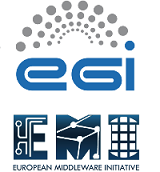Speakers
Conclusions
The StratusLab project provides an open-source cloud distribution that
can be installed by data centers to provide an IaaS platform for
running its grid and non-grid services as well as providing a cloud
computing service for its users.
The project provides incremental public betas approximately every six
weeks. The current releases are nearly feature complete providing
mechanisms for controlling computing, networking, and storage
resources of virtual machine instances. The first production release
will appear at the end of May 2012. The second year of the project
will concentrate on advanced management services and facilitating
sharing of resources through hybrid cloud infrastructures.
Description of the work
Clouds based on the StratusLab distribution, like all IaaS clouds,
allow users to configure and to control virtual machines remotely.
Users can customize the computing, storage, and networking
capabilities of their virtual machines.
The project, through a image repository, provides minimal
virtual machine images based on common operating systems: CentOS,
Ubuntu, and ttylinux. Users can deploy virtual machine instances
based on those images while specifying the computing capabilities
(CPU, memory, network, and storage) of the instance. They can also
build their own images from scratch or from existing images to
provide a customized computing environment and equally share those
images through the image registry.
Three different types of network addresses can be allocated: public,
local, and private. Public addresses allow users to deploy services
accessible from the WAN. Local addresses allow direct communication
between different machines within the same cloud infrastructure and
are appropriate for applications which require communication between
multiple workers, like MPI applications. Private addresses are
appropriate for workers within master/slave systems that use a pull
mechanism for retrieving tasks.
Data management services within the StratusLab distribution are based
on virtual disks. Read-only virtual disks are managed and shared with
the same tools as for virtual machine images. These can be used for
making standard datasets or databases, for example, visible on a
particular virtual machine instance. Read-write virtual disks can be
used to store persistently service state, databases, and logs. These
can be used only within a single cloud infrastructure and mounted by a
single machine instance.
Advanced features that allow the deployment and automated control of
complete services (e.g. a batch system) will be provided by the
project and a preview of these will be a part of the tutorial.
Impact
Participants will learn about cloud technologies in general and will
understand the distinction between Infrastructure as a Service (IaaS),
Platform as a Service (PaaS), and Software as a Service (SaaS)
infrastructures.
They will understand how infrastructures based on the StratusLab
distribution can be integrated with the European Grid Infrastructure
and how the cloud services complement grid services.
Practical exercises will teach the participants how to launch virtual
machines, customize their computing environment, share those
customized environments with others, manage virtual disks, and define
complete services.
Overview
StratusLab develops and provides an open-source cloud distribution
that allows data centers to expose their computing resources as an
"Infrastructure as a Service" (IaaS) type cloud. Administrators can
run their services over the cloud to improve availability,
scalability, and maintainability of their grid and non-grid services.
Virtual organizations and users can use the cloud to develop custom
computing environments and domain-specific services.
This tutorial presents the main features of the current StratusLab
distribution. Using the project's reference cloud infrastructure,
participants will see how those features can be used by system
administrators and scientists. The tutorial concludes with a
presentation of the project's development roadmap and schedule of
future releases.
Participants will be provided credentials for accessing the StratusLab
reference cloud infrastructure. They must provide a laptop with
python (2.6+), java (1.6+), and an ssh client installed.
URL
http://stratuslab.eu/

